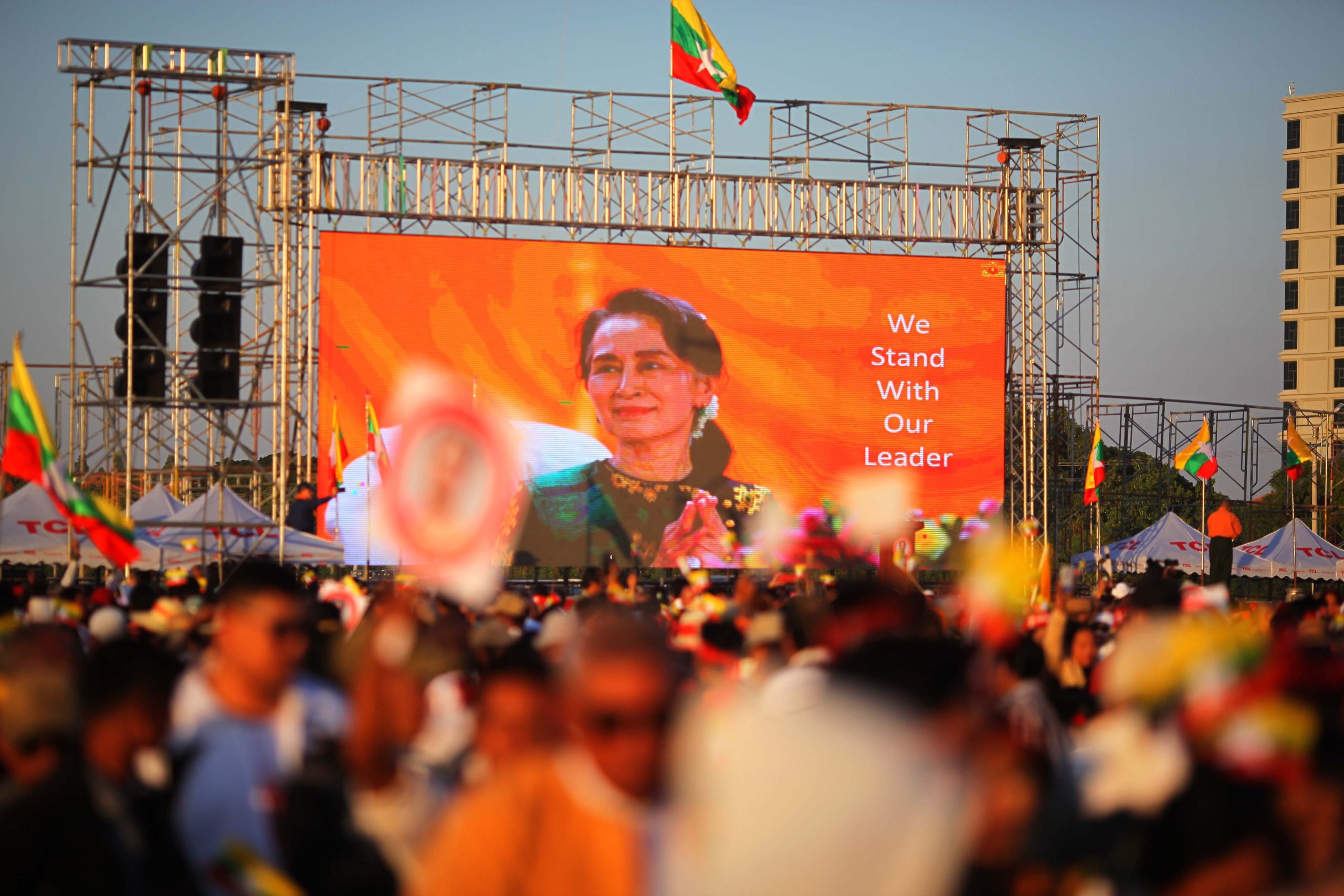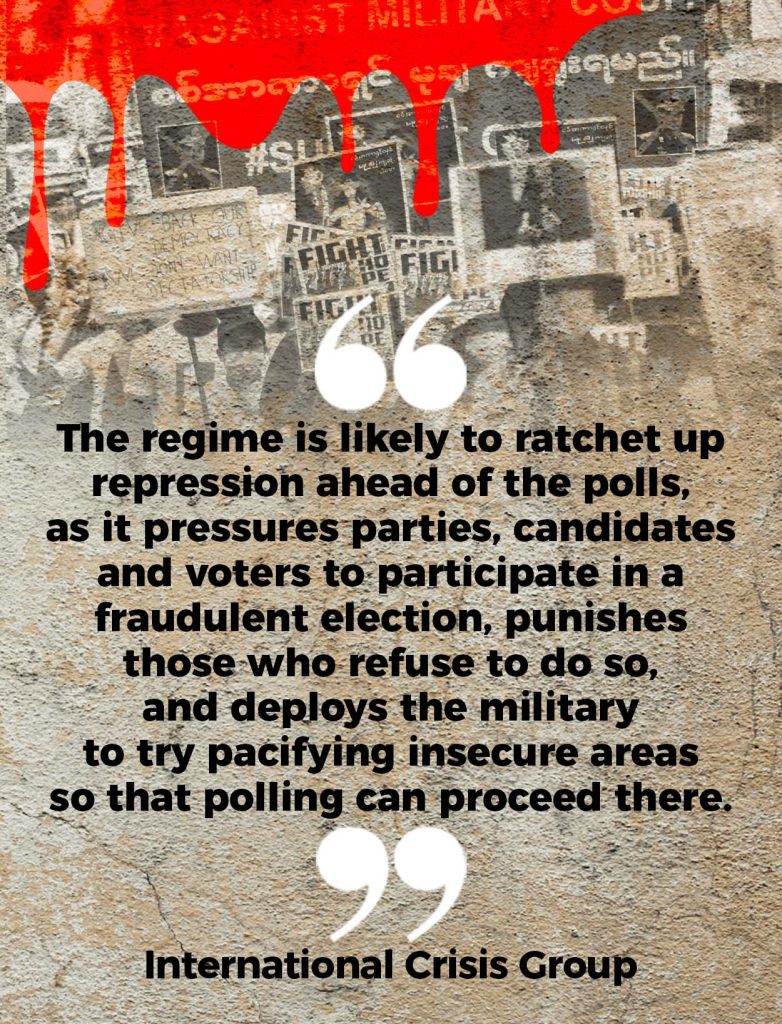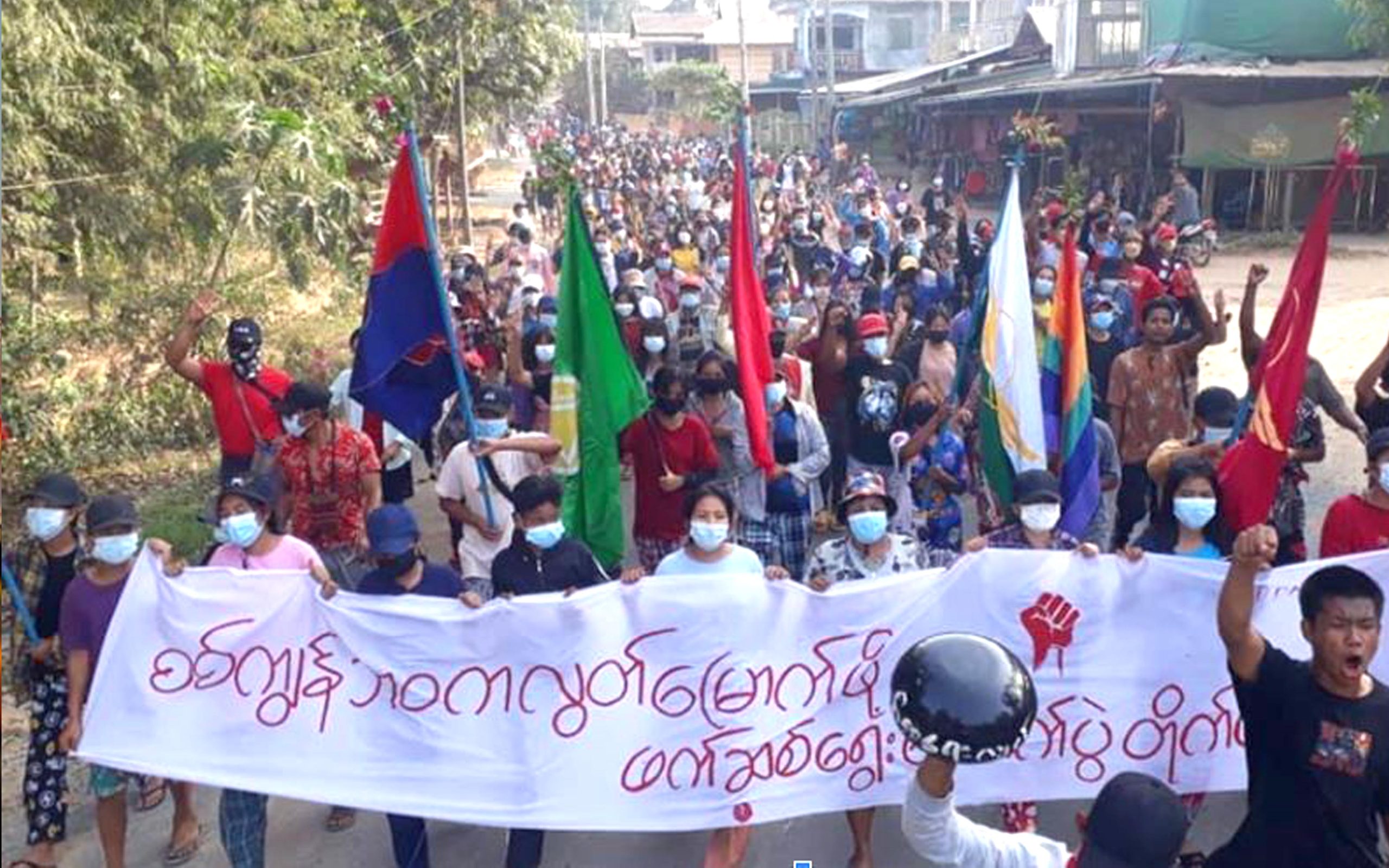|
Getting your Trinity Audio player ready...
|
A
s if Myanmar isn’t already awash in blood, analysts now say that the Southeast Asian country can expect only more violence and therefore more casualties as its ruling junta continues to push for elections that could take place this year at the earliest.
According to the Five-Point Road Map announced by the military soon after it seized power in February 2021, multiparty elections would be held nationwide, with the constitution stipulating it to happen before 1 August this year. But with the junta recently placing — for the third time — Myanmar under a state of emergency, the elections are now expected be held much later.
While the military says that it is simply adhering to the charter by holding elections, the popular view in Myanmar and overseas is that it is bent on having the polls simply to legitimize its rule. Its plans are also being opposed by most of the people of Myanmar, as well as members of the international community, who do not believe any election under the junta would be free and fair.

That means, say analysts, the junta is likely to turn to its favorite strategy to get its way: violence. But its opponents – many of whom are now also armed – are likely to fight fire with fire.
“The regime is likely to ratchet up repression ahead of the polls, as it pressures parties, candidates, and voters to participate in a fraudulent election, punishes those who refuse to do so, and deploys the military to try pacifying insecure areas so that polling can proceed there,” says the International Crisis Group in a recent post on its website. “The election will also be a target for resistance forces, some of which are already violently opposing it.”
A conflict analyst from another international research group says, “Attacks against polling stations, more political violence, and rising death rate can be expected as the immediate effects of the manipulated and forced elections. In the polls’ aftermath, there will also be another cycle of political violence. If international groups accept the results of the sham elections, there will be more grievances and desperate sentiments among the people, resulting in more and more political violence.”
Myanmar last held elections in 2020, which saw the National League of Democracy (NLD) of Nobel Peace laureate Aung San Suu Kyi clinch another landslide victory. But before the winners of those elections could take oath, the military seized control of the government, claiming election fraud without offering evidence.
A Civil Disobedience Movement was soon set up by many Myanmar people in protest over the coup. Peaceful demonstrations against the military regime were also held. The junta’s response, however, came in the form of bullets and arrests.
Since the 2021 coup, more than 3,000 people have been killed “through military crackdowns following pro-democracy movements,” says the rights group Assistance Association for Political Prisoners (AAPP). More than 16,000 people have been detained. AAPP stresses, however, that actual figures may be higher.
“What they’re (the Myanmar military) doing now is they are treating Myanmar’s people as their opponent and adversary,” the Agence France Press quoted James Rodehaver, chief of the U.N. Human Rights Office Myanmar team, as saying in a recent report. “You have a military making war against its own people.”
“Extreme in brutality”
For sure, the Myanmar military had underestimated the determination of the country’s people to protect their freedoms. The junta has declared martial law in 39 townships in which it has lost control. Many analysts predict that the military will use all of its power to bring these areas to heel, which would mean it would probably be committing more atrocities, including massacres and arson. Says an Asia analyst based in Edinburgh: “The military will be extreme in brutality as these six months will be the bases of its decision on whether it can hold an election in 2023 or early 2024.”
Sources: Asian Network for Free Elections, The Irrawaddy, Council on Foreign Relations
Many of those opposed to the elections, meanwhile, have already made clear just how far they are willing to go to put a stop to the plan. Starting last January, the military has been forcibly compiling voter lists across the country, but has encountered attacks from opposition groups. According to the junta-run media, there were at least seven attacks between 9 and 13 January alone in the Karen and Chin States, and in the regions of Sagaing, Taninthary, Magway, and Mandalay.
Should the elections push through, many analysts expect the lowest voter turnout in Myanmar’s history yet. Experts even say it seems impossible for the polls to be held simultaneously nationwide, with Singapore-based political analyst Kyi Sin predicting that the military may decide to hold the elections by area or in batches.
The junta, though, has also employed more physically benign tactics to try making its continued rule more acceptable to the people of Myanmar. It has reformed Myanmar’s official governing body, the State Administration Council (SAC), by including some ethnic political party leaders, such as Daw Dwe Bu, former vice president of the Kachin State People’s Party, as well as Pugin Kanglian (who would resign from the Zomi Congress for Democracy a few days later) and Mahn Nyein Maung, U Yan Kyaw, and Khun San Lwin of the Zomi Congress for Democracy, Karen People’s Party, Wa National Party, and Pa-O National Organization, respectively.
Comments Kyi Sin: “The SAC is trying to level up alliances with ethnic political parties through the PR system and elite political settlement for the upcoming election.” Fellow political analyst Ko Jim, who is based in Thailand, agrees, adding the move is obviously aimed at forming a government that will guarantee protection of the military’s interests.
Last January, the junta introduced as well a new party-registration law that, among other things, makes it more difficulties for civilian and ethnic political parties to run in elections. For one, a political party that will contest nationwide must have a membership of at least 100,000 within three months after registration. For another, such a party must have offices in at least half the country within six months, and would contest in at least half of all the constituencies.

In previous elections, there were only two parties who could contest at the national level: the NLD, whose leaders are either detained, in exile, or dead, and the military-backed Union Solidarity and Development Party (USDP). Remarks a researcher at an international think tank: “The new party-registration law ensures a USDP win in the upcoming elections.”
That’s not all, however. The junta has endorsed a new electoral system: proportional representation, though ‘first past the post (FPTP)’ was practised in the previous three elections. Under the new system, the junta is expected to form a political alliance that would include the USDP and smaller parties perceived to be its allies. (At least 30 of the 90 previously registered political parties are believed to be allies of the military.) The USDP has already built a coalition with some 22 parties, which recently released a joint announcement of their support for an extension of the military regime and its preparation for an election.
Fierce opposition
But resistance to the planned elections has been fierce both domestically and overseas. Leading domestic political forces formed the Anti-Sham Election Joint Working Committee and have lined up activities to oppose the holding of the polls. An announcement expressing similar sentiment was also released in the new year by the National Unity Government and the National Unity Consultative Council, which is made up of elected MPs, political parties, civil society groups, strike committees, and ethnic resistance groups such as the Karen National Union, Karenni People’s Progressive Party, and All Burma Students’ Democratic Front, as well as ethnic representative councils from Chin, Mon, Pa-O, Ta-aung, and Karenni.
The Kachin Independence Organization, Karen National Union, Karenni People’s Progressive Force, and Palaung State Liberation Front have voiced their rejection of the military’s election plan as well. Win Min, an independent Myanmar political analyst, notes, “Due to recent self-interest-oriented actions of the military, the ethnic armed groups and other ethnic forces realized that the SAC is not a reliable actor to engage with.”
International election groups have also issued a joint statement denouncing the planned polls and have urged members of the international community not to lend these elections any legitimacy. The U.N. Special Rapporteur on the situation of human rights in Myanmar has echoed this call, and even called the planned elections “a farcical exercise designed to perpetuate military control of Myanmar’s political system.”
Many countries in Asia, however, have been noticeably silent about the junta’s election plans. Yohei Sasakawa, Japan’s special envoy for national reconciliation, even said in an interview with Nikkei Asia: “The election should be held no matter what.”

“The international community might be divided,” says research analyst Kyi Sin. “Some countries think that the election is one of the possible alternatives to end the conflict.”
“Some countries such as China, Thailand, and Japan assume that the election could be a partial solution and starting point for the continuous engagement and ease the social and economic problems of the civilians,” political analyst Win Min also says.
“But,” he says, “that will never be true.”◉


























